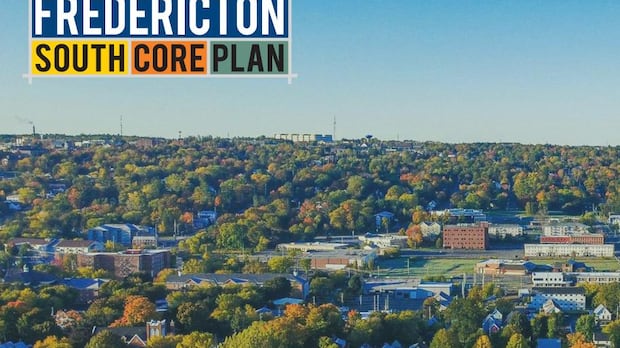New BrunswickWith a unanimous vote on Tuesday evening, Fredericton council approved the south core plan to significantly increase density in downtown areas, aiming to double the area’s population. Select corridor streets will be larger developments encouragedSam Farley · CBC News · Posted: Oct 15, 2025 5:00 AM EDT | Last Updated: 3 hours agoFredericton council approved the South Core Plan at Tuesday night’s meeting, which encourages larger developments on key corridor streets. (City of Fredericton South Core Plan)With a unanimous vote on Tuesday evening, Fredericton council approved the south core plan to significantly increase density in downtown areas, aiming to double the area’s population.The plan, which initially came up at council in early September, established updated zoning plans for roughly the area known as the Town Plat.Mayor Kate Rogers was absent Tuesday evening, but three councillors spoke in favour of the plan at the meeting, which was chaired by Deputy Mayor Jocelyn Pike.Coun. Cassandra LeBlanc, whose ward covers much of the area discussed in the plan, spoke the longest in support. She lauded the plan for protecting the character in existing neighbourhoods, while still meeting the need for growth at the same time. “I think that the plan did a really good job of trying to balance a lot of priorities in a sensitive and thoughtful way,” she said.Coun. Cassandra LeBlanc said she felt the plan balanced priorities in the right way. (Aidan Cox/CBC)Height requirements would be limited in existing neighbourhoods, while the densest growth in the Town Plat would be encouraged along major corridor streets. Smythe, York, Regent, Dundonald and Beaverbrook streets are all flagged in the plan.LeBlanc added that the majority of the areas in the plan would still require a rezoning process for larger buildings, some possibly up to 12 or 15 storeys in certain areas.Fredericton council considers higher-density housing plan for downtown neighbourhoods”The big change is that policy will be supporting those rezonings, but it still provides that opportunity for residents to engage,” LeBlanc said.LeBlanc did say that she hopes council would continue to work on affordable housing, saying the plan’s requirement of 20 per cent of units on publicly owned land to be priced affordably just wasn’t enough.The highest-density housing would be encouraged along major corridor streets, highlighted in orange, within the outlined south core area. (City of Fredericton South Core Plan)Coun. Jason LeJeune agreed, saying it was all about striking the right balance and called the plan progressive in how it approached this.Coun. Steven Hicks also offered his support at the end of discussions, saying the plan was a win for downtown businesses, which rely on foot traffic. A 300-page document tabled to council in September by senior planner Frederick Van Rooyen said the role of the plan will “set out a vision of conservation and stability in the established neighbourhood area, while targeting several key brownfield industrial sites with mixed-use and high-density residential development.”Most new development in the area would be apartments and stacked townhouses, the document said.Van Rooyen also wrote that the area will need to accommodate 3,200 new housing units, or about 6,000 new residents, which is “double the current population in this area.”In an interview after the meeting, LeJeune said this plan was the “most robust” planning process he had seen yet as a councillor.”And I think we got a great result that’s going to see us forward for the next 20 to 30 years.”When asked how soon residents could expect to see changes coming, LeJeune said it was up to property owners and developers.Existing development has happened “very gradually over time,” he said.”And I would expect that to be the case again. I don’t think tomorrow you’re going to see a 15-storey building go up in the midtown area,” LeJeune said.”It takes a few years to get something like that ready.”ABOUT THE AUTHORSam Farley is a Fredericton-based reporter at CBC New Brunswick. Originally from Boston, he is a journalism graduate of the University of King’s College in Halifax. He can be reached at sam.farley@cbc.ca
Fredericton council passes higher-density housing plan for downtown area











